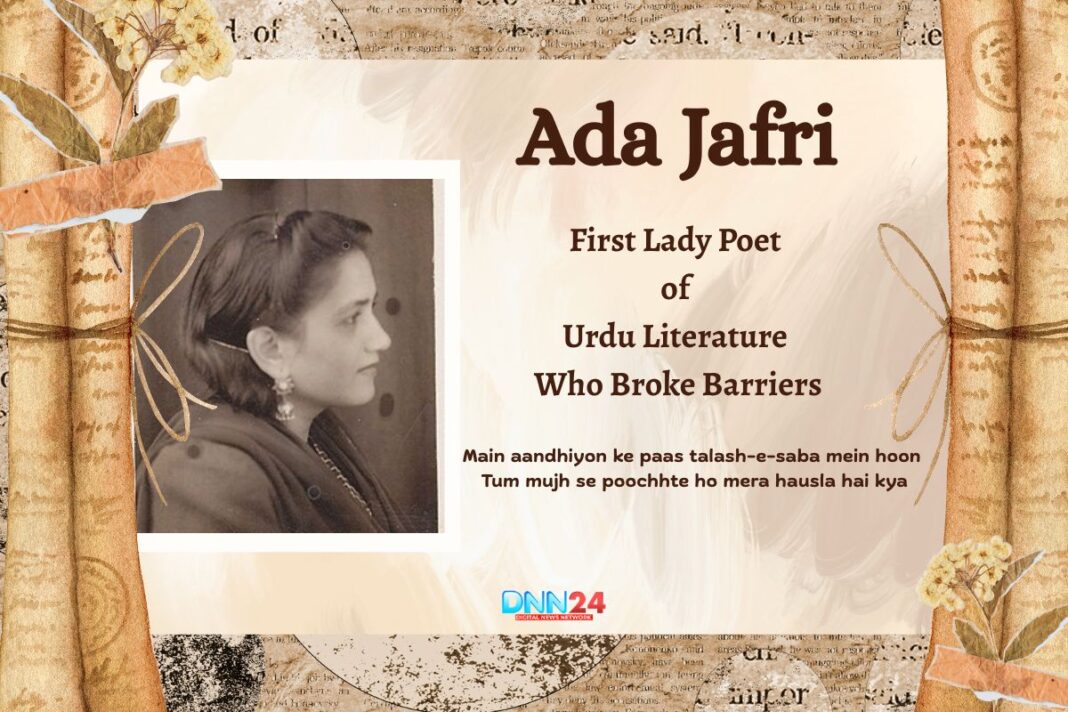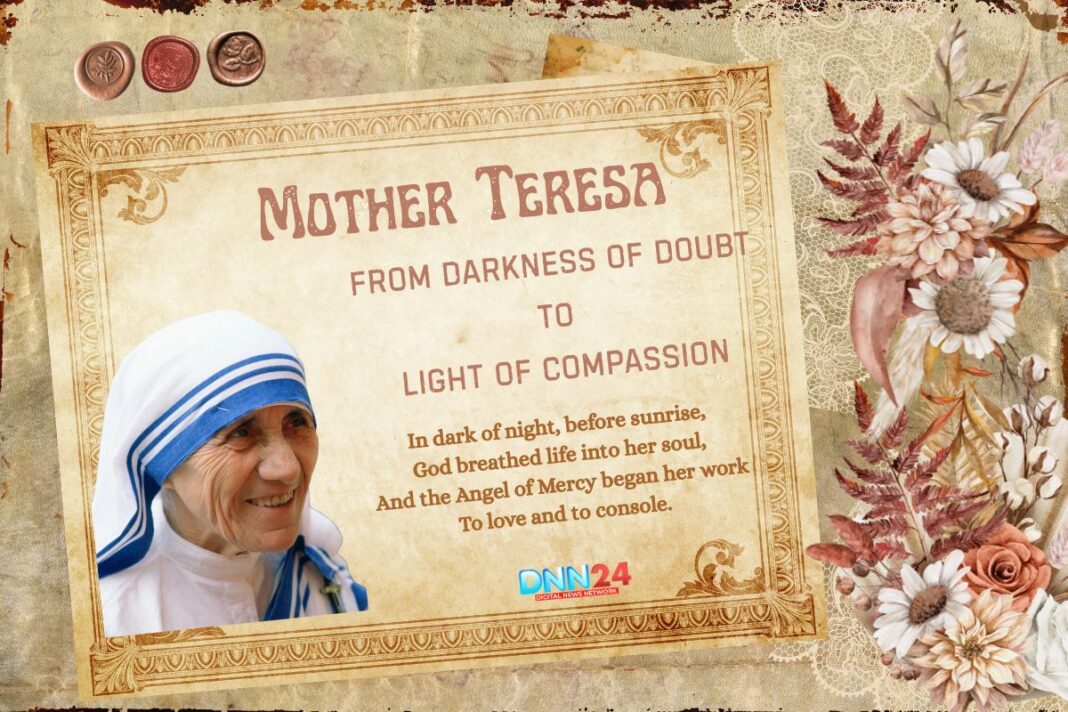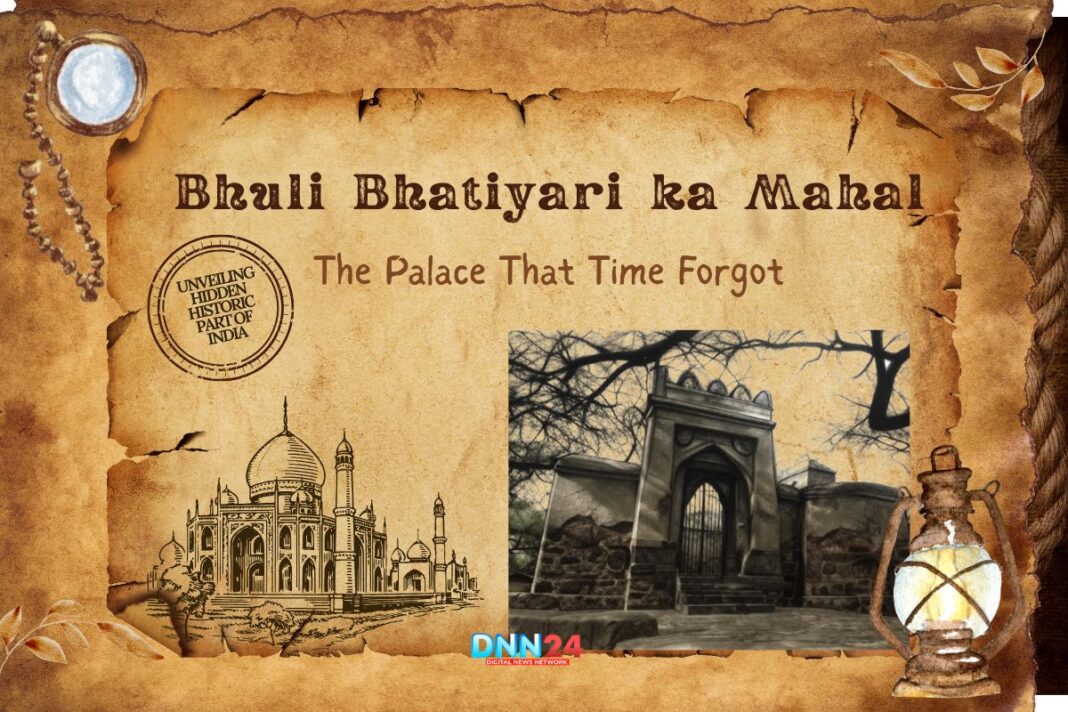When men dominated every poetry gathering in 20th century Urdu literature, Ada Jafri quietly entered their world and rewrote the rules forever with her extraordinary verses. She earned the title of ‘First Lady Poet’ in Urdu literature, and truly deserved it. Her life story reads like poetry itself – full of pain, passion, and that magical art of words that touches the soul directly.
Honton pe kabhi unke mera naam hi aaye
Ada Jafri
Aaye to sahi bar-sar-e-ilzam hi aaye
Ada Jafri was not just a poet; she was a revolution wrapped in gentle words.Her real name was Aziz Jahan, but the world knew her as Ada Jafri, who dared to dream in verses when dreaming itself was considered bold for women. Born on 22nd August 1924 in Badayun, British India, she carried the seeds of change that would bloom into beautiful poetry.
Hamare shahr ke logon ka ab ahwal itna hai
Kabhi akhbar padh lena, kabhi akhbar ho jaana
Her story is even more inspiring because she started this incredible journey at just 12 years old, writing poems that would later echo through generations. Her life was like a bridge connecting the old world of Urdu poetry with a new era where women’s voices could soar freely.
From Childhood Dreams to Poetic Reality
Little Aziz Jahan lost her father when she was barely three years old. This early loss shaped her profoundly, but instead of breaking her spirit, it made her stronger. She spent her childhood in her maternal grandparents’ home, where books became her closest friends. The absence of her father’s love created a void that she filled with words, emotions, and beautiful expressions.
hairan hain lab-basta hain dil-gir hain ghunche
Ada Jafri
KHushbu ki zabani tera paigham hi aae
At nine years old, she recited her first verse to her mother, who encouraged her wholeheartedly.Her family wasn’t particularly literary, but poetry flowed in her veins like a natural gift from God. Even in school, she would write nazms and ghazals, showing them to established poets like Mirza Hasrat Lakhnavi for improvement. This shows her dedication and thirst for learning from the very beginning.
achanak dilruba mausam ka dil-azar ho jaana
dua aasan nahin rahna suKHan dushwar ho jaana
She studied Urdu, Persian, and English with private tutors at home, though she always regretted not being able to attend college formally. Around 1940, her early ghazals and nazms started appearing in famous magazines like “Rooman,” “Shahkar,” and “Adab-e-Latif,” and soon the literary world began to take notice of this talented young woman who was destined for greatness.
ghar ka rasta bhi mila tha shayad
rah mein sang-e-wafa tha shayad
A New Chapter in Life and Love
The year 1947 brought a significant turning point in Ada Jafri’s life when she married Nurul Hasan Jafri, a high-ranking British Indian officer with deep connections with Urdu literature. After marriage, she moved to Karachi, Pakistan, with her husband. This new city, this new country, brought new dreams and new styles to her poetry.
ek aaina ru-ba-ru hai abhi
Ada Jafri
us ki KHushbu se guftugu hai abhi
Her husband became her biggest supporter and inspiration, proving that their flight reaches even greater heights when a talented person finds the right partner.Interestingly, when India was partitioned and Ada Jafri moved to Pakistan, she received tremendous respect and recognition.
Agar sach itna zalim hai to hum se jhoot hi bolo
Hamein aata hai patjhad ke dinon gulbar ho jaana
It’s fascinating to note that while the four great names of Urdu short stories – Manto, Ismat, Bedi, and Krishan Chander – mostly belonged to areas that became Pakistan (except Ismat), the great female poets like Ada Jafri, along with Parveen Shakir, Kishwar Naheed, and Fahmida Riaz, all had their roots in India. This cross-border literary connection shows how art and literature know no boundaries and how talent flows naturally across artificial divisions created by politics and geography.
Her Unique Style and Feminine Voice
The greatest beauty of Ada Jafri’s poetry was its soft and delicate tone. Her ghazals beautifully expressed women’s feelings, struggles, dreams, and pain. She presented love, separation, hope, disappointment, and life’s philosophy with such simplicity that everyone could connect with her words. Her poetry had a strange attraction, a simplicity that directly touched the heart and stayed there forever.
aaKHiri Tis aazmane ko
ji to chaha tha muskurane ko
What made her poetry special was that she saw and showed the world from a woman’s perspective. In an era when women’s voices were often suppressed, Ada Jafri used her poetry as a medium to speak her truth and create her identity. She didn’t write only about love and romance but also about social injustice and life’s bitter realities.
waise hi KHayal aa gaya hai
ya dil mein malal aa gaya hai
She is called the ‘First Lady of Urdu Poetry’ because her work in the mid-20th century paved the way for female poets, just as Wali Dakani had done for general poets in the 18th century. She prepared the path for later poetesses like Kishwar Naheed, Parveen Shakir, and Fahmida Riaz, who walked on the road she had made smooth and took women’s poetry in Urdu to the world stage.
Literary Contributions and Achievements
Ada Jafri didn’t just write ghazals; she also composed nazms and marsiyas (elegies). Her first collection was published in 1950 and received great appreciation. Her first book, ‘Main Saaz Dhoondhti Rahi’ (I Kept Looking for the Instrument), was published in 1967 and created a new wave in Urdu literature.
jo charagh sare bujha chuke unhen intizar kahan raha
Ada Jafri
ye sukun ka daur-e-shadid hai koi be-qarar kahan raha
After this, several more books followed, including ‘Sheher-e-Dard’ (City of Pain), ‘Ghazal-e-Shab’ (Night’s Gazelle), ‘Harf-e-Shanaasai’ (Letter of Recognition), and ‘Mausam Mausam’ (Season by Season). Ada Jafri also practised Japanese poetry, using the Haiku form, and wrote short stories. She published her autobiography, “Jo Rahi So Bekhabari Rahi” (What Remained, Remained Unconscious). Besides this, she also documented the lives of ancient Urdu poets.
kya jaaniye kis baat pe maghrur rahi hun
kahne ko to jis rah chalaya hai chali hun
She received several significant awards for her literary services, including Pakistan’s highest civilian award, ‘Tamgha-e-Imtiaz.’ She also received the Baqi Siddiqui Award, the Pakistan Writers Guild Award, and, in 2003, the Kamal-e-Fan Award, the most significant literary honour given to any poet in Pakistan. These honours appreciated her talent and told the world that women have an essential place in Urdu poetry.
A Legacy That Lives Forever
Ada Jafri lived a full and satisfying life of 90 years. She travelled to different countries with her husband and deeply observed their political, social, and cultural situations. She passed away in 2014, leaving behind a priceless legacy in the form of her poetry. Through her verses, she gave voice to women and gave new ground to Urdu literature. Her simplicity, her tone, her deep emotions—everything is such that it still attracts us today.
chaak-e-dil bhi kabhi silte honge
Ada Jafri
log bichhDe hue milte honge
Ada Jafri was not just a poetess; she was a revolution, a voice that changed the history of Urdu literature forever. Her poetry contains life’s truth, humanity’s pain, and a gentle ray of hope. Even today, when we read her ghazals, it feels as if she is talking directly to us, touching the strings of our hearts. Her legacy lives on, her poetry lives on, and will always live on, inspiring generations of women to find their voice and speak their truth through the beautiful medium of poetry.
Also Read: Mother Teresa: From Darkness of Doubt to Light of Compassion
You can connect with DNN24 on Facebook, Twitter, and Instagram and subscribe to our YouTube channel.



